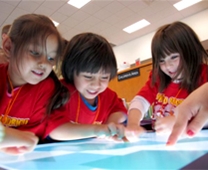 |
Recipient: Jenna Welch and Laura Bush Community Library, El Paso Community College Northwest Grant: IMLS Grants to States Program Amount: $140,901 |
Project Contact: |
We are thrilled to see library habits forming in the community, and we want residents to know that college is reachable.Focusing on technology and literacy, and exposing children to library resources early is an important first step to encourage lifelong learning.
—Monica Wong, Head Librarian
In 2003, The Jenna Welch and Laura Bush Community Library El Paso, Community College Northwest Campus was formed by an intergovernmental agreement between the City of El Paso and El Paso Community College as a combination academic/public library. Until then, the community in northwest El Paso had no library service available within a 10 mile radius. The community is agriculturally focused and 96 percent Spanish-speaking, with many migrant families and low literacy rates. Many of the residents with children did not own computers, did not read to their children, and had not developed a habit of using libraries.
To foster a long-term love of learning, a habit of library usage, and a college-going culture among the residents, the library created the Interactive Technology and Literacy Program (ITLP) with IMLS funding. It offers children and parents from low-income families an opportunity to learn technology and literacy skills together and to become familiar with library offerings.
Making Use of Libraries and Technology
Focusing on preschool and early elementary children and their parents, the library aimed to introduce technology as a learning tool. It purchased iPads and applications suitable for preschool children and their parents, prepared an engaging program of activities, and developed helpful resources to encourage parents to increase literacy activities in their home.
Staff also developed the bilingual activities for SMART Table—a multi-touch, interactive table that engages preschool learners, including students with special needs, in active discussions, problem-solving, and small group collaboration activities. New SMART Table modules explored butterfly and frog lifecycles and Tangram puzzle activities, integrating literacy and technology activities to engage children in listening, speaking, drawing, reading, and group problem-solving. For the majority of students, it was their first hands-on experience with technology.
Becoming Part of the Family Routine
The library partnered with local school districts, the local Canutillo Migrant Program, and Head Start Center to recruit children and families to ITLP. As community members were introduced to the facility, they discovered the multitude of other resources and programs there. Residents celebrated Dr. Seuss’ birthday with educational activities, participated in Read Across America, and took classes on drumming rhythm. The staff also extended an invitation to entire families to spend time at the library so that toddlers, their siblings, and parents can learn and use the library together.
After participating in the program, one parent said, “When I was little, I didn’t have access to the library or have my own card. I am from Mexico and they do not teach you the importance of reading and books and that it is so important to use your imagination, to investigate. I am very happy that my kids have this program. [It] is easier to teach them to read…that you have to take care and to be responsible [for] the books and to bring them back. I love the programs that you have for the summer; it makes my kids very happy and curious for knowledge.”
Another adult participant said, “Now that I know about this library, I will make it a point to get my child a library card and make weekly trips. I think that involving the whole family will result in a very useful tool for the future.”
Expanding Participation—and Minds
The library’s sessions have reached hundreds of Head Start participants and local families, and attendance is steadily growing. In 2012, the project provided 74 sessions to 1,425 individuals. A survey of parents found that eighty percent of respondents said they now read to their children at least once a week, with 28 percent of this group reading daily to their children.
Local school administrators and community organization leaders praised the positive impact of the programs and have asked the library to continue this programming. Other school districts have also reached out to request Interactive Technology and Literacy programs, and the library was invited to the 2014 “Seguimos Creando Enlaces” library conference in San Diego sponsored by the State Library of California to make a presentation about the program (PDF, 2 MB). There was also overwhelming positive feedback from the toddlers participating in the programs. Maya, a shy, three-year old, left the library smiling and hugging several library facilitators, announcing, “I am coming back to the library.”